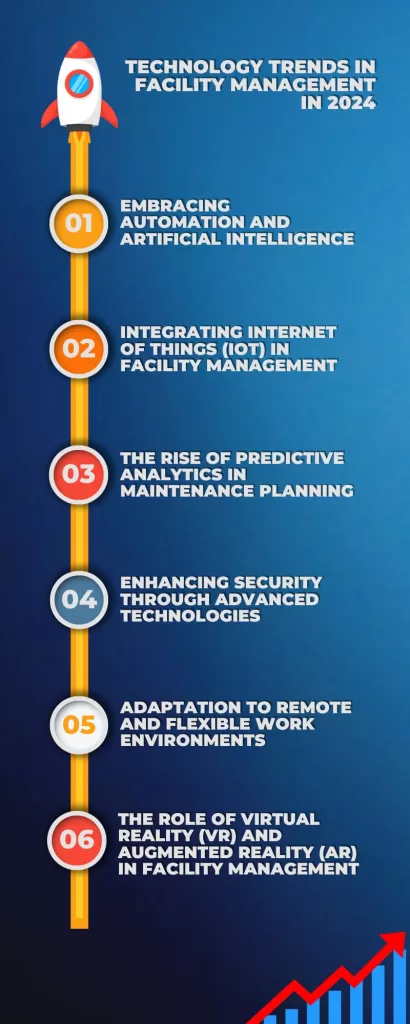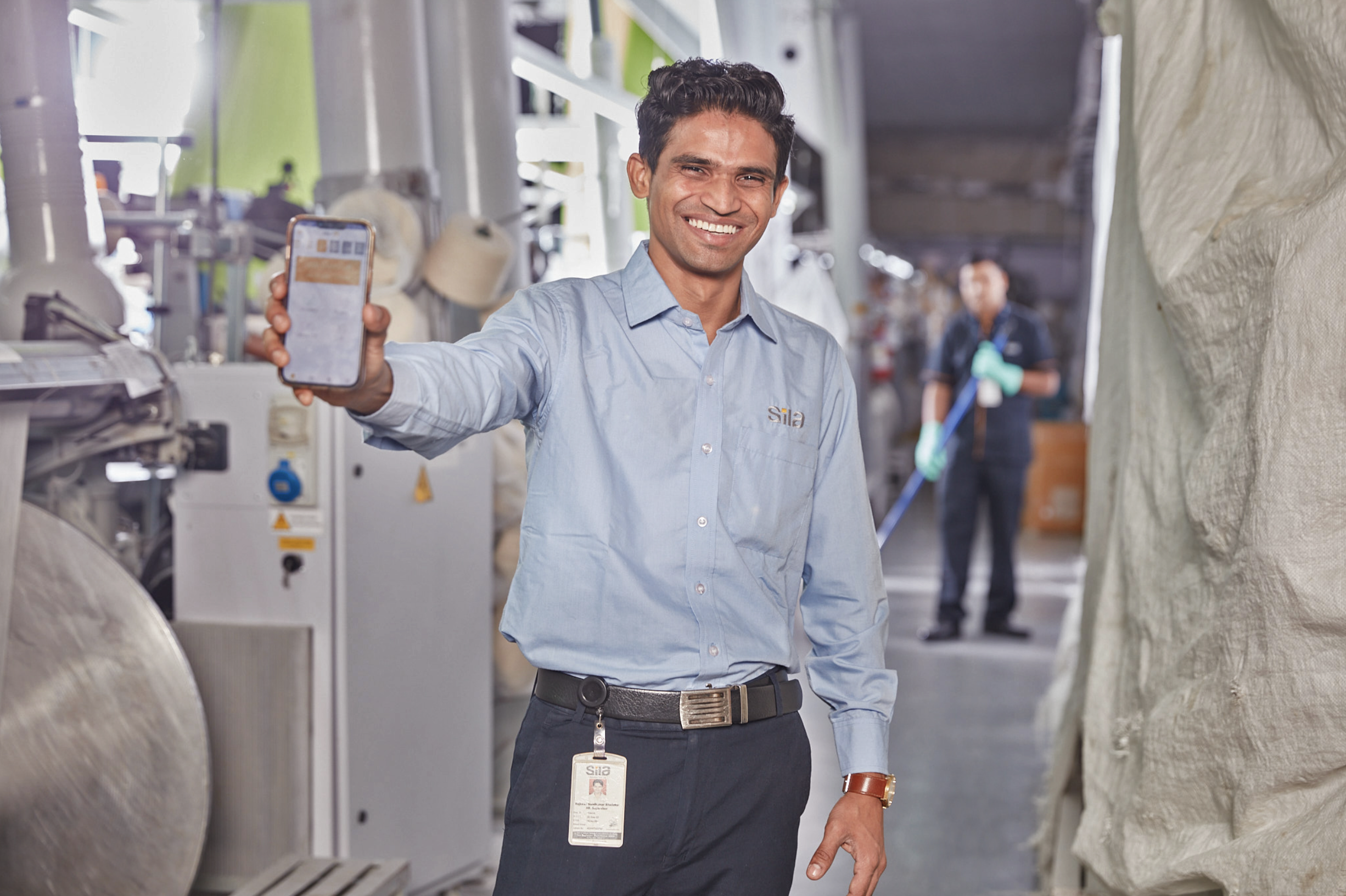1. Introduction
Facility management plays a crucial role in ensuring the smooth operation and maintenance of commercial buildings and properties. In recent years, the industry has witnessed significant advancements thanks to technology, transforming the way facilities are managed and maintained. From the integration of smart buildings and IoT devices to the implementation of advanced data analytics and automation, the future of facility management looks promising and highly efficient. In this blog, we will explore the technology trends that are shaping the field of facility management and discuss the implications for businesses and property owners. Whether you are a facility manager or simply interested in the future of building management, this blog is for you.
2. The importance of staying ahead in facility management
Staying ahead in the field of facility management has never been more crucial. With the rapid pace at which technology is advancing, it is essential for facility managers to stay updated with the latest trends and developments. By embracing and adopting new technologies, facility managers can significantly improve the efficiency, productivity, and sustainability of their buildings.
One of the key advantages of staying ahead in facility management is the ability to anticipate and address potential issues before they escalate. With the use of advanced data analytics and predictive maintenance, facility managers can identify patterns and trends, allowing for proactive decision-making and preventive maintenance. This not only reduces downtime but also extends the lifespan of equipment and reduces overall operational costs.
Additionally, staying ahead in facility management enables businesses and property owners to provide a seamless and comfortable experience for occupants. By leveraging technologies such as smart building automation, IoT devices, and mobile applications, facility managers can optimize energy usage, monitor indoor air quality, and provide personalized settings for occupants. This creates a more productive and sustainable environment, resulting in increased tenant satisfaction and improved bottom line.
In conclusion, the future of facility management lies in staying ahead of the game. By being proactive and embracing the latest technology trends, facility managers can enhance operational efficiency, improve occupant experience, and drive sustainable practices.

3. Embracing automation and artificial intelligence
In the ever-evolving field of facility management, automation and artificial intelligence (AI) are poised to play a vital role in shaping the future. The integration of smart sensors, machine learning algorithms, and robotic automation has the potential to revolutionize how facilities are managed and operated.
One key aspect of automation in facility management lies in the use of smart sensors and IoT devices. These sensors can gather a vast amount of data on various building systems, including temperature, humidity, occupancy, and energy usage. By analyzing this data in real-time, facility managers can identify areas of improvement, optimize energy consumption, and create more comfortable environments for occupants.
Furthermore, the adoption of AI technologies enables facility managers to streamline operations and improve decision-making. AI-driven algorithms can analyze data patterns, predict maintenance needs, and automate routine tasks, freeing up time for facility managers to focus on strategic planning and higher-value activities.
Robotic automation also plays a significant role in facility management. Robots can be deployed to perform repetitive tasks such as cleaning, maintenance, and security patrols, reducing the reliance on manual labor and increasing efficiency.
The integration of automation and AI technologies in facility management not only enhances operational efficiency but also contributes to cost savings and sustainability. By automating processes and utilizing AI algorithms, facility managers can reduce energy waste, optimize resource allocation, and minimize downtime.
With the increasing advancements in automation and AI, facility managers who embrace these technologies will have a competitive advantage in the market.
4. Integrating Internet of Things (IoT) in facility management
The Internet of Things (IoT) is becoming increasingly prevalent in facility management as the benefits of connected devices continue to be realized. By integrating IoT technology into facility management systems, organizations can collect and analyze data from a wide range of sensors and devices, ultimately enabling more informed decision-making and optimized operations.
IoT devices, such as smart sensors and meters, can capture real-time data on energy usage, occupancy levels, and environmental conditions. This data can be monitored and analyzed to identify patterns, trends, and anomalies, empowering facility managers to proactively address issues and optimize resource allocation.
For example, by leveraging IoT data, facility managers can implement predictive maintenance strategies. By analyzing equipment performance data and receiving alerts for potential failures or malfunctions, managers can schedule maintenance proactively, minimizing downtime and reducing costs.
IoT can also enhance sustainability efforts in facility management. By monitoring and controlling energy usage in real-time, facility managers can identify areas of inefficiency and implement energy-saving measures. This not only reduces costs but also supports environmental sustainability goals.
In addition, the integration of IoT devices can improve occupant comfort and productivity. By leveraging sensor data on occupancy, temperature, and air quality, facility managers can optimize heating, cooling, and ventilation systems to create a more comfortable and healthy environment for occupants.
As we look ahead to the future of facility management in 2024, the integration of IoT into facility management systems will continue to be a key trend.
5. The rise of predictive analytics in maintenance planning
In the rapidly evolving landscape of facility management, predictive analytics is poised to become a game-changer when it comes to maintenance planning. By harnessing the power of IoT data, coupled with advancements in artificial intelligence (AI) and machine learning (ML), facility managers can anticipate and address maintenance needs with unparalleled precision.
Traditionally, facility maintenance has been reactive, with repairs and replacements being made only after a piece of equipment or system fails. However, with the advent of predictive analytics, facility managers can shift from a reactive to a proactive maintenance approach. By analyzing historical data, monitoring real-time performance metrics, and detecting anomalies, AI-powered algorithms can predict when equipment is likely to fail or require maintenance.
This level of foresight enables facility managers to schedule maintenance activities in a well-planned manner, avoiding unexpected breakdowns and reducing costly downtime. Additionally, predictive analytics can optimize resource allocation by identifying which assets require immediate attention, allowing managers to prioritize maintenance activities and allocate resources accordingly.
Moreover, predictive analytics can contribute to cost savings by extending the lifespan of assets through timely maintenance and reducing unnecessary repairs or replacements. It also enhances operational efficiency by enabling facility managers to schedule maintenance during non-peak hours or periods of lower occupancy, minimizing disruptions to daily operations.
6. Enhancing security through advanced technologies
With the rapid advancements in technology, facility management is not only focusing on maintenance optimization but also on enhancing security. In 2024, facility managers can expect a significant shift towards the utilization of advanced technologies to ensure the safety of their premises.
One such technology is facial recognition, which can provide a higher level of security compared to traditional methods like access cards or passwords. By implementing facial recognition systems at entry points, facility managers can accurately identify authorized personnel and prevent unauthorized access. This technology can also be integrated with video surveillance systems to track and monitor suspicious activities in real-time.
In addition to facial recognition, the use of biometric authentication methods such as fingerprint or iris scanning will become more prevalent. These authentication methods offer higher security levels by providing unique and non-transferable access to restricted areas.
Furthermore, the integration of artificial intelligence and machine learning algorithms with security systems will enable facility managers to detect abnormal patterns and anomalies, thereby enhancing threat detection capabilities. AI-powered algorithms can analyze data from various sensors and devices to identify potential security breaches and send real-time alerts to the appropriate personnel.
7. Adaptation to remote and flexible work environments
In addition to advancements in security measures, facility management in 2024 will also see a significant adaptation to remote and flexible work environments. The global pandemic has accelerated the shift towards remote work, and this trend is expected to continue well into the future.
Facility managers will need to create spaces that are conducive to remote work, providing employees with the necessary tools and technologies to collaborate effectively from anywhere. This may include implementing cloud-based communication and project management systems to facilitate seamless remote collaboration.
Moreover, flexible work arrangements, such as coworking spaces, will become more prevalent in facility management. These spaces offer individuals and companies the flexibility to rent workspaces on a short-term basis, allowing for increased mobility and adaptability.
Facility managers will need to envision and design office spaces that cater to both remote and in-office workers. This may involve creating hybrid office environments that incorporate digital collaboration tools and flexible furniture layouts to accommodate different work styles and preferences.
8. The role of virtual reality (VR) and augmented reality (AR) in facility management
Virtual reality (VR) and augmented reality (AR) are set to play a transformative role in facility management in 2024 and beyond. These technologies offer new and exciting possibilities for designing, visualizing, and managing spaces.
VR can provide facility managers with the ability to create immersive, virtual environments that allow for the planning and visualization of a space before it is built. This can be particularly useful when redesigning office layouts to accommodate both remote and in-office workers. Facility managers can use VR to simulate how different furniture arrangements and design elements will impact the overall functionality and aesthetic of the space.
AR, on the other hand, can enhance the maintenance and repair processes in facility management. By overlaying digital information onto the real-world environment, AR can provide technicians with real-time data and instructions, making it easier and more efficient to identify and fix issues.
Both VR and AR have the potential to revolutionize how facility managers approach design, maintenance, and operations.
9. Conclusion: Preparing for the technology-driven future of facility management
As facility management professionals, it is essential for us to stay informed about the latest technological advancements that can enhance our work. The future of facility management is undeniably intertwined with technology, particularly with the emergence of virtual reality (VR) and augmented reality (AR). In this blog, we have explored the potential of VR and AR in facility management, highlighting their ability to transform design, maintenance, and operations.
Looking ahead, it is crucial for facility managers to start preparing for this technology-driven future. Familiarizing ourselves with VR and AR tools, understanding their capabilities, and exploring how they can be integrated into our strategies will be imperative. By doing so, we can harness the power of these technologies to streamline processes, improve efficiency, and enhance the overall management of our facilities.
As technology continues to advance, facility managers must embrace innovation and adapt to the changing landscape.
SILA adopts a tech-driven approach, utilizing Robotics and IoT, Automated Compliance Management, and our proprietary technology (SILA Connect) to efficiently manage properties across India. As pioneers in technology within the facility management sector, SILA stands out as one of the best facility management service provider in India.
To delve deeper into our integrated facility management services, click here.
Industries We serve –
Commercial Offices & Buildings | Manufacturing & Heavy Industrial Facilities | Residential Complexes & Townships | Hotels & Campuses | Airports & Malls | IT Parks & Data Centers | Warehousing & Logistics Parks | Banks & Retail
Present in 125 cities –
Ahmedabad | Baroda | Bengaluru | Chennai | Bhubaneswar | Delhi | Gurugram | Noida | Kolkata | Hyderabad | Kochi | Mumbai | Pune & more
Get a free quote today, to reduce your facility management cost.
FAQs -
1. What are soft services in facility management?
Soft services encompass a range of human-centered services aimed at creating a comfortable, secure environment. These services primarily involve human interaction and contribute to enhancing the overall ambiance. Examples include housekeeping, payroll management, pest control, front office management, pantry services, front desk support, and horticulture.
2. What are the hard services in facility management?
Hard services in facility management refer to the physical and structural elements that are essential for the operation, functionality, and maintenance of a facility. These services typically involve machinery, systems, and infrastructure. Some examples of hard services include mechanised cleaning services, managing & maintaining HVAC and Electrical Systems, Plumbing and Water Management, Fire Safety and Security Systems, Waste Management etc.
3. How does outsourcing Facility Management lead to cost savings?
Facility Management proves to be cost-effective. Managing spaces in-house can incur significant expenses. However, outsourcing it not only reduces the time your staff spends overseeing facility operations but also results in long-term savings.
4. What is mechanized housekeeping?
Mechanized housekeeping refers to the use of machinery, equipment, and automated tools in performing various cleaning tasks and maintenance activities within a commercial or residential space. This approach involves the use of specialized cleaning equipment such as vacuum cleaners, floor scrubbers, polishers, steam cleaners, pressure washers, and robotic devices designed to automate or simplify cleaning processes.
5. How does Facility Management play a key role in an organization's success?
Facility Management (FM) plays a pivotal role in an organization’s success by contributing to various aspects that directly impact efficiency, productivity, and overall performance. FM ensures that the physical workspace, infrastructure, and systems are well-maintained, safe, and conducive to work. A properly managed facility promotes productivity among employees by providing a comfortable and efficient working environment.
About SILA -
SILA – A Real Estate platform driven by an entrepreneurial spirit.
Our businesses include Real Estate Services which offer Facility Management, Contracting Solutions and Real Estate Advisory. Our other business is Real Estate Development. We have a diverse client base in various sectors which include large Corporates, Real Estate Funds, Landowners and Developers.
Over the last decade, SILA has scaled efficiently, managing over 150 million square feet of assets, with over 20,000 employees pan India. The platform is backed by Norwest Venture Partners and Samara Capital Group in our Real Estate Services and Development arms, respectively.
SILA is one of the best facility management service provider in Mumbai, Bengaluru, Delhi, Chennai, Hyderabad, Pune & more.


